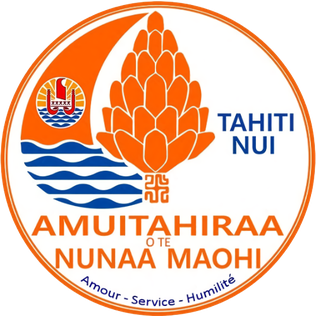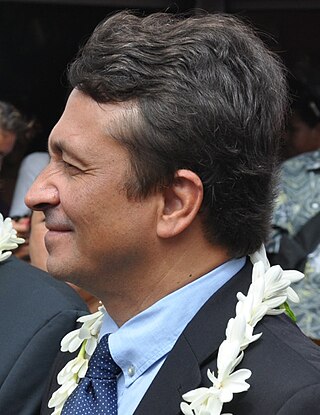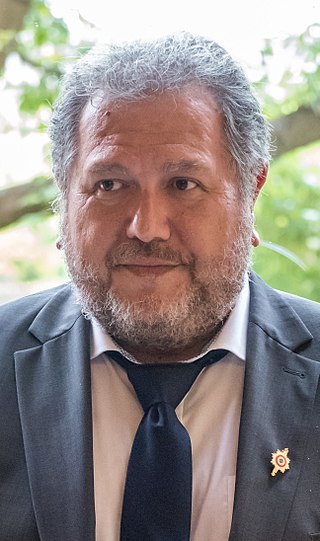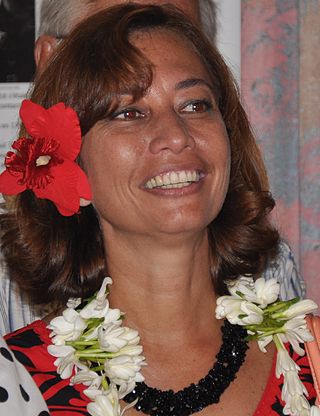
Tāvini Huiraʻatira, also known as Tāvini huiraʻatira nō te ao māʻohi – FLP, is a pro-independence political party in French Polynesia. Founded in 1977 as the Front de libération de la Polynésie (FLP), the party has been led since its inception by Oscar Temaru. From 2004 to 2013 it was part of the Union for Democracy (UPLD) coalition.

Amuitahiraʻa o te Nunaʻa Maohi, known as Tāhōʻēraʻa Huiraʻatira until January 2022, is a political party in French Polynesia. The party is conservative, pro-autonomy party and anti-independence. It was founded in 1977 by Gaston Flosse, who supports French Polynesia's current autonomy arrangement with France and who led it for over 20 years.

The Assembly of French Polynesia is the unicameral legislature of French Polynesia, an overseas country of the French Republic. It is located at Place Tarahoi in Pape'ete, Tahiti. It was established in its current form in 1996 although a Tahitian Assembly was first created in 1824. It consists of 57 members who are elected by popular vote for five years; the electoral system is based upon proportional representation in six multi-seat constituencies. Every constituency is represented by at least three representatives. Since 2001, the parity bill binds that the number of women matches the number of men elected to the Assembly.

Winfred Édouard Tereori Fritch is a French Polynesian politician who served as President of French Polynesia from 2014 to 2023. He previously presided over the Assembly of French Polynesia on three occasions: from April 2007 to February 2008, from February 2009 to April 2009 and from May 2013 to September 2014. Until 2015, Fritch was co-president of Tahoera'a Huiraatira, a pro-French political party, before he became president of the newly-established Tapura Huiraatira.

Nuihau Laurey is a French Polynesian politician and former Cabinet Minister. He was vice-president of French Polynesia from 2014–2017 and one of the two senators for French Polynesia from 2015 to 2020. He was acting president of French Polynesia in 2014 between Gaston Flosse and Édouard Fritch's presidencies.

Tapura Huiraatira is a political party in French Polynesia. It was founded on 20 February 2016 by members of Tahoera'a Huiraatira, a parliamentary coalition in the Assembly of French Polynesia. It is chaired by Édouard Fritch, the President of French Polynesia. Its first congress was attended by 8,000 people, including 38 Polynesian mayors. Nicole Sanquer was the party's only Member of Parliament before she left to join A here ia Porinetia.

Moetai Charles Brotherson is a French Polynesian politician who has served as President of French Polynesia since 12 May 2023.
Teura Iriti is a French Polynesian politician, member of the Assembly of French Polynesia, and former member of the Senate of France. Since June 2020 she has served as Mayor of Arue. Originally a member of Tahoera'a Huiraatira party, she is now a member of Tāpura Huiraʻatira.

Nicole Sanquer is a French Polynesian politician, and former Cabinet Minister. She was a member of the French National Assembly from 2017 to 2022. Elected as a member of Tapura Huiraatira, she sits in the UDI and Independents group in the French Parliament. In 2020 she formed the A here ia Porinetia party.

A here ia Porinetia is a political party in French Polynesia. The party was formed in August 2020 and advocates a reduction in the size of the Assembly of French Polynesia to 39 members, the introduction of term limits to renew the political class, the legalisation of medicinal cannabis, and the repeal of French Polynesia's vaccination law.

The Council of Ministers is the executive branch of the government of French Polynesia. It is headed and appointed by the President of French Polynesia.

Teva Rohfritsch is a French Polynesian politician and former Cabinet Minister. Since 2020 he has been one of French Polynesia's two senators in the French Senate, sitting with the Rally of Democrats, Progressives and Independents.
A Tia Porinetia was a political party in French Polynesia. The party was founded in February 2013 by Teva Rohfritsch and members of To Tatou Aia and other small parties. The party was autonomist, and opposed the inclusion of French Polynesia on the United Nations list of non-self-governing territories.
Eliane Tevahitua is a French Polynesian politician and Cabinet Minister who is currently vice-president of French Polynesia. She is a member of Tavini Huiraatira.
Valentina Hina Cross is a French Polynesian politician and Member of the Assembly of French Polynesia. From 2008 to 2014 she served as mayor of Teva I Uta. She is a member of Tavini Huiraatira. She is the daughter of former Assembly president Milou Ebb.
Patrick Howell is a French Polynesian civil servant, politician, and former Cabinet Minister. He is a member of Tapura Huiraatira.
Joséphine Teapiki Épse Teakarotu is a French Polynesian politician and oyster farmer who served in the Assembly of French Polynesia from 2018 until 2023. A member of the Tāpura Huiraʻatira party, she represents the eastern portion of the Îles Tuamotu-Gambier.
Tevaiti-Ariipaea Pomare is a French Polynesian actuary, civil servant, politician, and Cabinet Minister.














